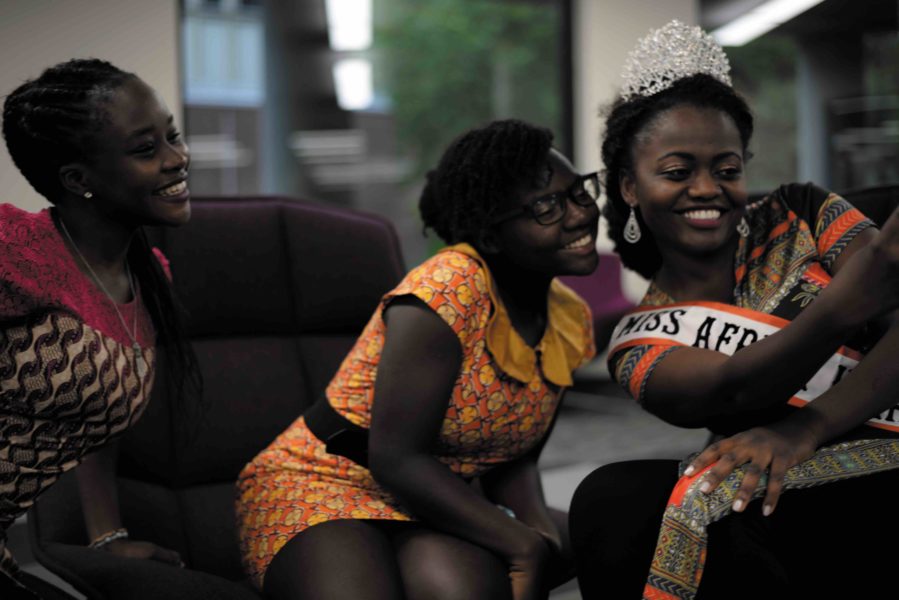Don’t call Ayomipo Kayode-Popoola African-American, because she is not — she is African and proud of it.
Kayode-Popoola was born in Nigeria and lived there until 2010 when her family began the slow process of moving to Moscow, she said. She and her youngest brother moved to Moscow six months after Kayode-Popoola’s mother moved to the U.S.

Joleen Evans | Argonaut
Sophomore Ayomipo Kayode-Papoola (middle) hangs out with friends sophomore Sami Olape (left) and senior Olivia Balemba (right) in the UI Library.
“She was working almost full-time, going to school, getting her master’s and taking care of two kids,” Kayode-Popoola said.

With her father owning a business in Nigeria, Kayode-Popoola said he spent most of his time there and visited the U.S. every few months.
“It was definitely trying times for my entire family,” Kayode-Popoola said. “All of us had to step up. I had to step up, being the oldest.”
Kayode-Popoola helped take care of her younger siblings, all while adjusting to being in a foreign country, she said.
Kayode-Popoola said she has an “appreciation of language,” as she is able to speak Spanish, Latin, Greek and Yoruba, the native language of her tribe. But she said she was fortunate enough to grow up speaking English, so she didn’t face a language barrier in Moscow.
Kayode-Popoola said when she first came to America it was easy for her to put her culture aside and assimilate with American society.
“They’ll make fun of you because of your accent, they’ll laugh at how your hair is, they’ll laugh at the weird things your family does,” Kayode-Popoola said. “It’s so much easier to just try and be American and not be made fun of.”
She said she subconsciously began to distance herself from her culture and became more “Americanized.” Last year, when she came to the University of Idaho and joined the African Students Association (ASA), she said she found a new appreciation for her culture.
“Meeting so many authentic Africans my age, not only Africans, but so many international students who are so vivacious and so proud of their culture, so proud of where they’re from, who tangibly display their culture, who are so proud of their national identity and their cultural identity, has been really impactful,” Kayode-Popoola said.
At the end of the spring 2016 semester, Kayode-Popoola became the president of ASA and is now the driving force toward improving its annual event, Africa Night.
Kayode-Popoola said they’re already working on the event. She said the main goal this year is to have a bigger presence at Africa Night, not only in terms of audience size, but in regard to the number of university performers.
In past years, Kayode-Popoola said at Africa Night the majority of the performers were not UI students, but instead they were from places like Washington State University. She said she wants to incorporate more UI students as well as members of the Moscow community.
Today, Kayode-Popoola said she is confident with her African background.
“I would never say I’m African-American, because first off, I’m not an American citizen,” Kayode-Popoola said. “Even assuming I was an American citizen, my cultural identity and my roots are in Africa. I was born in Nigeria. I am a Nigerian.”
She said she wouldn’t want to take away the title from African-Americans who have history in America and said it’s disrespectful to them as well as her ancestors.
Double-majoring in Spanish and international studies, Kayode-Popoola said she appreciates other cultures and encourages others to be open-minded about them.
“If you see that girl who is wearing a hijab or see that boy who has a different accent, go talk to him, go learn about his story,” Kayode-Popoola said.
Marisa Casella
can be reached at
or on Twitter at @marisacasella1